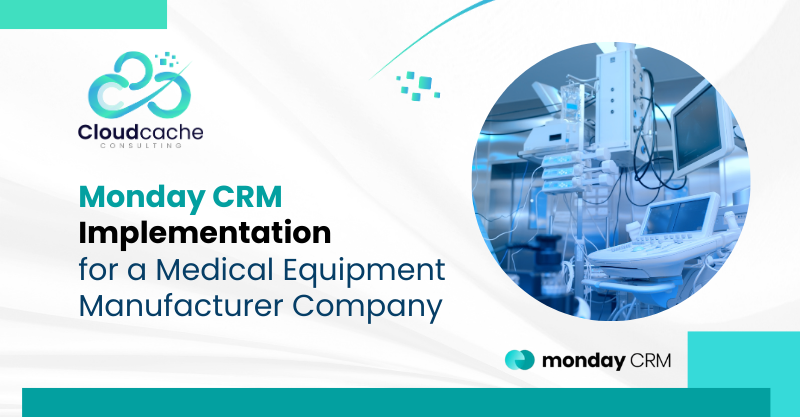
Monday CRM implementation for a Medical Equipment Manufacturer
Summary
A medical equipment manufacturer wanted to automate its workflows with Monday CRM implementation. With guidance from CloudCache Consulting, a certified monday.com partner, the company shifted from spreadsheets to a unified system. This transformation highlights how effective monday.com implementation services drive efficiency in regulated industries.
About The Company
Our client is a medical equipment manufacturer company that produces diagnostic machines and surgical consumables. They operate in USA and sell to hospitals, clinics, and specialist distributors.
Customer challenges
The company faced three core problems. First, they lacked a single place to track production status, orders, and service requests. Information lived in silos. Second, compliance work consumed too much time. Audits required pulling data from many sources and reconciling records manually. Also, their reps struggled in managing spare parts and capacity planning. Procurement didn’t always know what the factory needed. Engineering handoffs to production were unclear. Meetings spent time finding the right document instead of solving problems. The business needed faster turnarounds, better traceability, and lower risk of non-compliance.
Solutions
Monday CRM implementation for a Medical Equipment Manufacturer
We designed a focused Monday CRM implementation that addressed operations and regulatory needs. The work began with a short discovery to map the company’s most critical workflows. We then built standard boards for orders, production runs, quality inspections, calibration schedules, and service tickets. Each board used clear status columns, date tracking, and ownership fields to remove ambiguity.
Automations handled routine updates. For example, when a production order moved to “Ready,” the procurement board received a flag to reserve parts. When a calibration was due, the service team got an automatic reminder and a linked log entry. We added dashboards that combined real-time KPIs — open orders, lead times, stock levels, and pending audits — so managers could see bottlenecks at a glance.
Integrations connected monday.com to the ERP for inventory levels and to the ticketing system for customer service records. We also created form-based intake for new engineering change requests to capture the correct data up front. The result was a single source of truth that kept work moving and kept audit trails intact. This approach reflects best practice for monday.com implementation and leans on experience from certified partners.
We kept releases small. That allowed teams to adopt features gradually. We also coached local champions in each department so the changes stuck.
Results
For client, Production visibility improved and managers reduced manual status checks. Order-to-delivery times shortened because procurement and shop floor teams got timely signals. Inventory accuracy rose, lowering emergency part orders. The quality and compliance teams gained faster access to objective records. Audit preparation time dropped significantly because traceability lived in one place.
Teams reported less context-switching and fewer status-update meetings. Engineers handed off build packages with clear checklists. Service technicians followed calibration logs that linked directly to devices and serial numbers. Overall, the platform turned scattered data into actionable work. These outcomes show what a focused monday.com implementation can do when teams and tools align.
Technology and Tools Used
Monday CRM
Final words
This project proved that practical, people-first change delivers measurable results. A well-scoped Monday CRM implementation—combined with clear workflows and targeted training—fixed the company’s biggest pain points. CloudCache Consulting, a monday.com partner, provided the monday.com implementation services and helped the client move from chaotic spreadsheets to predictable operations. You can find us on Upwork as well.





